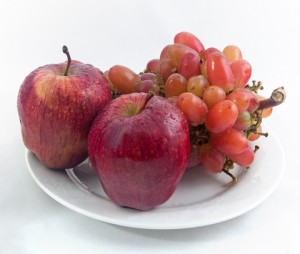Is Foreign-Grown Produce Safe?
It’s the dead of winter here in the Northeast, and maybe, just maybe you’re tiring of root vegetables? Eating locally is one thing, constant deprivation is another. Pooped out on parsnips? Need some green leafies? Fresh fruits? What to do?
I will admit to spending a fortune on organic blueberries and raspberries in the last few weeks (see yesterday’s “What I Ate” post) . . . they’re super-delicious and refreshing on salads and cereal, or just swimming in non-fat kefir “soup” with cinnamon. And I do buy organic salad greens and baby spinach all year ’round. A Semi-Sweet reader recently asked me: “What about buying produce from other (read: warm!) countries? Is that safe?” Well Sweeties, you ask, I answer!
Generally, it seems that a pesticide is a pesticide is a pesticide – no matter where your produce is coming from, if it’s conventionally grown (as opposed to organic), it’ll have some pesticide residue, which we’d probably all like to avoid. Even the Environmental Working Group’s Shopper’s Guide lumps domestic and imported produce together – only where there is “an extreme difference in the score of a food’s imported and domestic versions,” (as with imported grapes), do they note that in the ranking.
That said, on the EWG’s own site, they do mention that:
in a study of Costa Rican farmers growing produce for the U.S. market, Dr. Ryan Galt of the University of California at Davis found that 12 of 15 pesticides used on squash, and 5 of 47 on chayote [a gourd veg that's eaten like potatoes] were not registered for use on foods in the U.S. FDA inspection tests did not cover 71 percent of the chemicals used on squash and 61 percent used on chayote. (Galt 2009). Some of these chemicals, notably n-methyl carbamates, were highly toxic. Galt found that U.S. agencies made little effort to determine which pesticides were being used in Costa Rica and that Costa Rican farmers had little access to Spanish language information about U.S. pesticide standards. Between 1996 and 2006, 1.6 percent of domestic crops violated pesticide safety standards in FDA inspections, while imported crops earned violations at 2.25 times that rate (FDA 2008).
Hmmm . . . that’s not OK.
So what’s the bottom line? Should you forego fruits and veggies if they’re not organic or domestically grown? No. By all means, eat your fruits and vegetables! The health benefits of a diet rich in fruits and vegetables outweigh the risks of pesticide exposure. Even the EWG stresses this. Use tools like EWG’s Shopper’s Guide to reduce your exposures as much as possible – did you know that you can lower your pesticide consumption by nearly four-fifths by avoiding the 12 most contaminated fruits and vegetables and instead eating the least contaminated produce?
What do I do at my house? My choices go in this order: domestically grown organic (and the more local, the better), foreign-grown organic, domestically grown conventional, foreign-grown conventional. I generally stay away from conventional produce that’s listed on the EWG’s Dirty Dozen list. That includes NOT buying conventional strawberries for my strawberry-lovin’ daughter, which right now is a major sticking point in our house. The kid can eat a pound in a sitting, and I feel like that with quantities like that, my growing kid should be eating organic only – that said, I did break down and buy a pound of conventional the other day because she was literally crying about not having had them for a couple of months . . . what can I say? I went soft.
You’ll be happy to know that I held my ground and did not give into the request for Ice Breakers Sugar Free Sours.
© 2011, Sarah. All rights reserved.
-
Mike
-
Elizabeth
-
http://discoveringcandace.blogspot.com Candace











